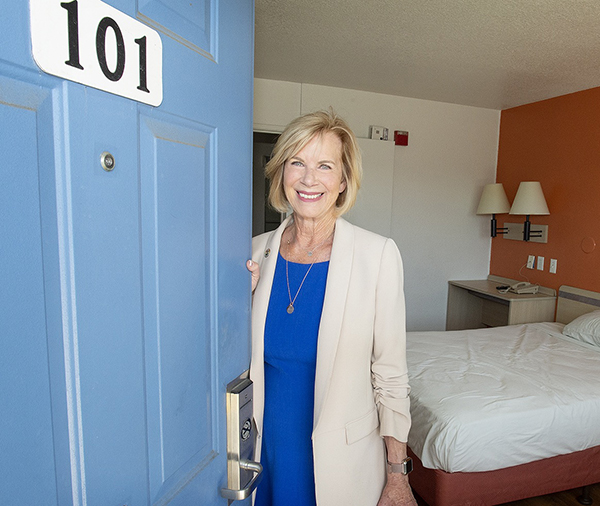By Alfredo Santana
Contributing Writer
WEST WHITTIER — A former Motel 6 will be converted into 97 permanent studio apartments for the homeless as part of the state and Los Angeles County’s plan to grow available housing to solve the homeless crisis.
Holos Communities, a nonprofit involved in making housing for low-income residents, the homeless and people with mental illness, was tasked with the project.
Turning the empty facility into housing for the homeless is the main goal of Project Homekey, a program spearheaded by Gov. Gavin Newsom that originally called for offering temporary shelter to the elderly and more at-risk street populations when COVID-19 transmissions peaked in 2020.
Formerly known as Project Roomkey, the program provided about $90 million from state and federal funds to purchase 10 facilities.
The former Motel 6, now christened the Laurel Grove Project, is located on Pioneer Boulevard across the street from Pioneer High School, a few yards from the San Gabriel River (605) Freeway exit at Slauson Avenue.
Public records indicate that the county purchased the former motel from G6 Hospitality Property for nearly $10.9 million, including escrow fees of $40,000.
At a press conference it was announced that the facility will receive its first tenants after its inauguration by the end of next year, and would be fully occupied early in 2024.
Los Angeles County Supervisor Janice Hahn said that remodeling motels and hotels into housing is “one of the most effective tools” in the county’s efforts to tackle homelessness.
“They are quick and cost effective, and I am proud that I have more Project Homekey motel conversion sites in my district than any other supervisorial district in L.A. County,” Hahn said.
The supervisor thanked the community for being supportive of the plan amid the backdrop that many neighborhoods in Southern California have pushed back against efforts to house the homeless in hotels built near homes and schools.
Formerly named the West-Whittier-Los Nietos Motel 6, the two-story facility is currently surrounded with a chain-link fence covered with a dark green tarp.
Right now, the empty shell is painted white with blue doors, and there are plans to develop amenities such as a “pocket park” in what was a parking lot to counter high temperatures during summer.
Other amenities planned for the site are a “living lung” to block air and noise from the nearby freeway, and a greywater irrigation system to feed the living lung, the pocket park and additional landscaping.
Future residents would have access to a laundry room and parking, plus an additional unit would be designed for the manager.
“Each building that we develop has the power to clean the air, preserve and recycle water, provide open space, address food insecurity, increase wildfire resilience and provide opportunities for economic mobility,” Holos Communities CEO Christian Ahumada said.
The portfolio of Project Homekey properties purchased by the county in 2020 included former motels in Baldwin Park, Hacienda Heights, Harbor City, Long Beach, Norwalk, and two in Compton.
Later that year, another motel in Commerce was added to the list at a cost of $14.95 million, when the Studio 6 Motel fell victim to the pandemic.
When purchased, the Commerce’s four-story facility had 81 units available.
Cheri Todoroff, executive director for the Los Angeles County Homeless Initiative, said remodeling motels into housing for the homeless cost half of what building an affordable housing site would cost and can be done in about a third of the time.
“[The building] has been operating since the start of the pandemic as a Project Roomkey site, so this was a place for people who were vulnerable to COVID to come inside during the pandemic,” Todoroff said in a prepared video.
In 2022, the county added 14 hotels and multi-apartment facilities, including nine interim housing and 291 units for families with $179.7 million allocated in state grants as part of Homekey Round 2.
On March 29, Gov. Gavin Newsom announced $736 million in grants for local governments to fund the third round of Homekey buyouts, or to build new housing for people without homes.
In addition, the county Board of Supervisors approved a $609.7 million budget in February to continue the fight against homelessness for the 2023-24 fiscal year, with $524 million obtained from Measure H, the voter-approved measure to create a revenue stream to combat homelessness from 2017 throughout 2027.
According to next year’s budget breakdown, the largest share, $270.2 million, would be used to support permanent housing, followed by $182.2 million for temporary, or transitional shelter.
Local jurisdictions are expected to receive $25.5 million, prevention services would get $20.9 million, coordination services would take in $14.08 million, connection services would be allocated $57.06 million, and stabilizing services would get $22.9 million.
Lastly, $16.8 million is geared to cover administrative costs.












